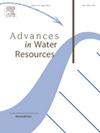Free convection in fractured porous media: A numerical study
IF 4.2
2区 环境科学与生态学
Q1 WATER RESOURCES
引用次数: 0
Abstract
The objective of this study is to better understand the influence of fractures on the possibility of free convection in porous media. Fractures are ubiquitous in porous media and criteria based on upscaled permeability are known to fail for fractured porous media. To this aim, we introduce a novel method for the assessment of convective stability through the eigenvalue analysis of the linearized numerical problem instead of solving the problem in time until a steady state is reached. The new method is shown to be in agreement with existing literature cases both in simple and complex fracture configurations. With respect to direct simulation in time, the results of the eigenvalue method lack information about the strength of convection and the steady state solution, they however provide detailed (quantitative) information about the behavior of the solution near the initial equilibrium condition. Furthermore, not having to solve a time-dependent problem makes the method computationally very efficient. The results of this work allow us to determine the dominant convective modes in 2D and 3D and to shed light on the role of the porous matrix in convective circuits.

裂隙多孔介质中的自由对流:数值研究
本研究的目的是为了更好地理解裂缝对多孔介质中自由对流可能性的影响。裂缝在多孔介质中是普遍存在的,基于提高渗透率的标准对于裂缝性多孔介质来说是不成立的。为此,我们引入了一种通过对线性化数值问题的特征值分析来评估对流稳定性的新方法,而不是在达到稳态之前及时解决问题。结果表明,该方法在简单和复杂的裂缝形态下都与已有的文献案例相吻合。相对于直接的时间模拟,特征值方法的结果缺乏对流强度和稳态解的信息,但它们提供了关于初始平衡条件下解行为的详细(定量)信息。此外,不需要解决与时间相关的问题使得该方法在计算上非常高效。这项工作的结果使我们能够确定2D和3D中的主要对流模式,并阐明多孔基质在对流电路中的作用。
本文章由计算机程序翻译,如有差异,请以英文原文为准。
求助全文
约1分钟内获得全文
求助全文
来源期刊

Advances in Water Resources
环境科学-水资源
CiteScore
9.40
自引率
6.40%
发文量
171
审稿时长
36 days
期刊介绍:
Advances in Water Resources provides a forum for the presentation of fundamental scientific advances in the understanding of water resources systems. The scope of Advances in Water Resources includes any combination of theoretical, computational, and experimental approaches used to advance fundamental understanding of surface or subsurface water resources systems or the interaction of these systems with the atmosphere, geosphere, biosphere, and human societies. Manuscripts involving case studies that do not attempt to reach broader conclusions, research on engineering design, applied hydraulics, or water quality and treatment, as well as applications of existing knowledge that do not advance fundamental understanding of hydrological processes, are not appropriate for Advances in Water Resources.
Examples of appropriate topical areas that will be considered include the following:
• Surface and subsurface hydrology
• Hydrometeorology
• Environmental fluid dynamics
• Ecohydrology and ecohydrodynamics
• Multiphase transport phenomena in porous media
• Fluid flow and species transport and reaction processes
 求助内容:
求助内容: 应助结果提醒方式:
应助结果提醒方式:


